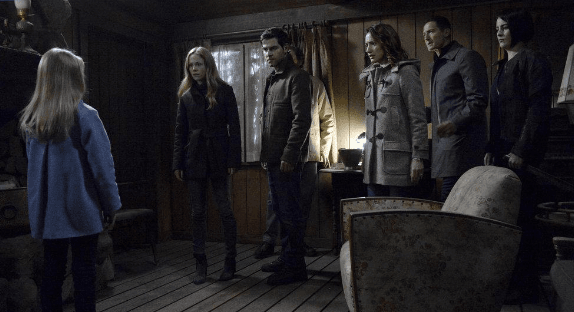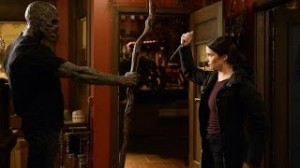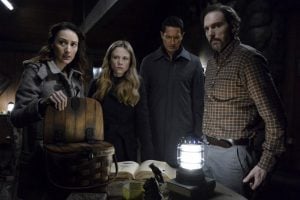
“Thy rod and thy staff they comfort me.”

All things must come to an end and this week, after six years of Wesen encounters and mystical treks, Grimm comes to a close. Losing a show where you’ve invested in the characters for so long can hurt; such loss can almost feel like you’re losing a dear friend, sans the seriousness of actually losing an important person in your life. Any fictional work—whether it be television, movies, games, or books—garners success when it draws you into its characters and transfers their emotional trials and tribulations onto you. Some are more successful than other true and, while some may leave you sobbing, others can leave you raging. And then there are those like the Grimm finale which left me with feelings of both utter disappointment and truly wanting more.
“The End” picks up moments after last week’s Portland PD massacre. Disoriented and in shock at the death of Hank and Wu, Nick tries to resurrect them using the Stick to no avail. He and Trubel—who was too late to help at the precinct—regroup with the others to relay the news that Zerstorer is pretty much unstoppable. Thankfully there may be a blood spell that can knock the skull-faced destroyer off his perch. While the others leave, Nick and Julieve remain at the shop only to be attacked by Zerstorer. For a second time, Nick is helpless to save someone he loves. This time it’s Julieve that falls victim to Zerstorer’s monstrous might. Her final words— “no regrets”—sends Nick into a haze of rage and despair. The emotional fallout from his loss foreshadowed an evening that would be filled with tension and even more heart break.
And then it jumped the shark.

If ‘jump the shark’ isn’t your cuppa tea, how about ‘goes off the rails’…and not in a good way. Death of primary characters in an entertainment medium must be scripted well. At its best, a death can galvanize both the remaining characters and the audience. Even when it’s overtly used as a plot device, where rhyme nor reason can be seen, a well-crafted death scene can still tug on our emotions, despite the obvious manipulations. But then there are those like “The End” which come so fast and furious that each mounting death takes away from the previous sacrifice. I admit that last week, I was taken aback by Hank and Wu going down but it really didn’t hit me until Nick’s reaction this week. The icing on that cake of death was Julieve snuffed out early on in the finale. Despite her drastic change from the Juliet we’ve known since Season One it was still hard to watch. Nick’s berserker reaction to it made things even more real. I knew there may have been one or two more deaths on the horizon but then…well then, everyone dies. And I do mean everyone.
The remaining members—Monrosalee, Adalind, Trubel, and Renard—hole up in the cabin from the very first episode. They need to mix the blood of a Grimm, Wesen, and Hexenbiest together in order to make this nuclear blood weapon. Blood spell complete, Diana tromps in and somehow turns from being terrified of Zerstorer to being okay with him taking her and Kelly. Even more puzzling is her lack of reaction when Zerstorer skewers Renard before her. But we don’t get much time to ponder this as, like dominos, everyone but Nick falls to Zerstorer. The deaths came so fast and furious that any emotional reaction was stunted by the rapid fire executions. They were delivered with such wanton carelessness that I knew, without a doubt, that some or all of these characters would be returned to us. But more on that later.
Understandably broken with only Trubel returned to life—as a gesture of good will—Zerstorer asks for the thing he’s wanted all along: the Stick. With it, his power would become absolute and our world forfeit. Sadly, Nick is in such a bad place he cannot see this. Trubel does and while she fights him, is unsuccessful in keeping him from bringing doom to the world.
Enter the deus ex machina, aka Kelly Burkhardt and Aunt Marie.
We never get a straight answer as to why Nick’s deceased Grimm relatives appear just when he needs them but they do and are able to convince him not to give up. With their ghostly aid, Nick and Trubel (who cannot see the two) make short work of Zerstorer. With the battle won, Nick tries to use Zerstorer’s now whole staff to resurrect his friends. Before he can, the portal opens and Nick is sucked in…
…and deposited back into that moment he and Julieve escaped the Other Side. The following reunion plays out like the end of “It’s a Wonderful Life”, with a jubilant Nick hugging those he’d lost. Though it was good to see everyone united under one roof at the end of things but it could not erase the sleight of hand the writers gave us. I felt cheated in a way; not because I wanted everyone to die but because, save for the Nick/Julieve scene, the lead-in to the two admittedly well done climactic fight scenes was nothing more than smoke and mirrors, actions that lacked heart and took away from what could have been an emotional payoff worthy of the Grimm name. When I look to how we got to this point, I can’t help but be filled with a thorough disappointment of what could have been.
As we continued on a small part of my disappointment was washed away by the smallest of scenes. Twenty years later, an adult Kelly puts the finishing touches on this story as his elder sister Diana enters the room. Turns out hunting has become the family business, with Monrosalee’s triplets also mentioned as a part of the team. Though Grimm has exited Stage Left and “The End” failed to deliver, this snippet of a future tale made me smile. It may have even given me hope that, though Nick Burkhardt’s story as told on the small screen may be over, there are other media to tell those stories still waiting to be told. And in that, “The End” may find its saving grace.
Grimm: “The End”—3 woges out of 5
